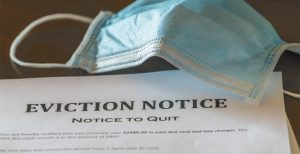By Cameron G. Woodward, Florida Evictions Attorney
 As most landlords are no doubt aware, the Biden administration has revised/extended the Covid-19 eviction moratorium in an attempt to delay the eviction of tenants who have failed to pay rent. As things stand currently, it is difficult to anticipate whether any court would issue a Final Judgment of Eviction on failure to pay rent alone. The Supreme Court has ruled such an extension would require an act of Congress and the Biden Administration countering with a revised eviction moratorium. However, what is not in dispute is a landlord’s ability to evict based on a breach of lease for something other than nonpayment of rent. Such an eviction can occur under one of two scenarios, either the tenant commits a “non-curable breach” or a “curable breach.”
As most landlords are no doubt aware, the Biden administration has revised/extended the Covid-19 eviction moratorium in an attempt to delay the eviction of tenants who have failed to pay rent. As things stand currently, it is difficult to anticipate whether any court would issue a Final Judgment of Eviction on failure to pay rent alone. The Supreme Court has ruled such an extension would require an act of Congress and the Biden Administration countering with a revised eviction moratorium. However, what is not in dispute is a landlord’s ability to evict based on a breach of lease for something other than nonpayment of rent. Such an eviction can occur under one of two scenarios, either the tenant commits a “non-curable breach” or a “curable breach.”
What is A Non-Curable Breach?
In the first scenario, the tenant would have committed a breach that is “non-curable” under Fla. Stat. 83.51(2)(a) “[e]xamples of noncompliance which are of a nature that the tenant should not be given an opportunity to cure include, but are not limited to, destruction, damage, or misuse of the landlord’s or other tenants’ property by intentional act or a subsequent or continued unreasonable disturbance.” In this scenario, eviction is relatively straightforward. The tenant breaches the lease in a non-curable manner, and the landlord sues for eviction after filing the requisite notice.
What is A Curable Breach?
In the second scenario, the tenant would have committed a breach that is “curable” under Fla. Stat. 83.51(2)(b) “[e]xamples of such noncompliance include, but are not limited to, activities in contravention of the lease or this part such as having or permitting unauthorized pets, guests, or vehicles; parking in an unauthorized manner or permitting such parking; or failing to keep the premises clean and sanitary.” If, after the landlord provides notice of such breach, the tenant either: 1) fails to rectify the breach within seven (7) days after written notice as received by the tenant; or 2) if the noncompliance reoccurs within 12 months, the landlord may terminate the lease and sue for eviction.
In Conclusion
In either of the two scenarios listed above, such an eviction action would not be subject to the Biden Administration’s eviction moratorium revision/extension. Further, a landlord may still be able to attach damages for a tenant’s failure to pay rent, making such action worthwhile in the event the tenant has violated the lease as described above.
If you or someone you know is currently involved in a landlord-tenant dispute, it is important to contact an attorney to assist you and keep you informed of the updates in the law.
Cameron G. Woodward is a Naples native who graduated from Naples High School before attending Stetson University in Deland, Florida, and then Ave Maria School of Law. Cameron proudly joins his father, Mark J. Woodward, Esq. and his uncle Craig R. Woodward, Esq. at the law firm focusing his practice on real estate law, evictions, condominium and community association law, and government relations law.
Naples Office:
3200 Tamiami Trail N, Ste 200
Naples, FL 34103
239-649-6555
Marco Island Office:
606 Bald Eagle Dr, Ste 500
Marco Island, Fl 34145
239-394-5161









